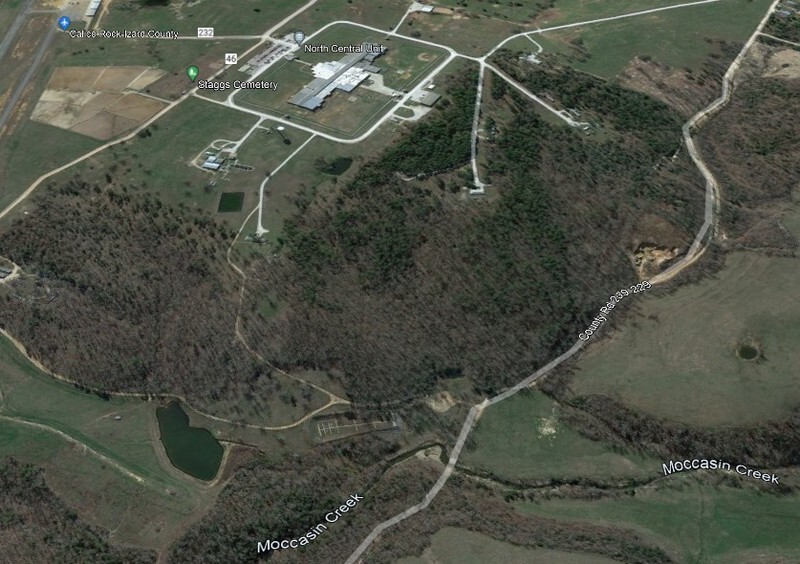ADC Ordered to Eliminate Pollution of Moccasin Creek
October 4, 2022
Share This Page
According to the Arkansas Department of Environmental Quality (DEQ), the wastewater treatment facility of the Arkansas Department of Corrections (ADC) has polluted Moccasin Creek, a tributary of the White River, on numerous occasions over the past decade. These violations of the facility’s Clean Water Act discharge permit stretch back to at least 2012.
The DEQ, on December 13, 2021, published a review of the certified Discharge Monitoring Reports submitted by ADC in accordance with its Clean Water Act permit. The following violations of the permitted discharge limits are from October 1, 2018, through Oct 21, 2021:
a. Twenty (20) violations of fecal coliform bacteria;
b. Fifteen (15) violations of nitrate plus nitrite-nitrogen;
c. Eight (8) violations of total suspended solids;
d. Five (5) violations of ammonia nitrogen;
e. Three (3) violations of dissolved oxygen;
f. Two (2) violations of oil and grease; and
g. One (1) violation of carbonaceous biochemical oxygen demand.
The review also revealed that ADC reported flows greater than the facility’s permitted design flow every month out of the 36-month review period.
To address the permit violations, the DEQ and the ADC entered into a Consent Administrative Order (CAO) on July 22,2022. In addition to the recent violations mentioned above, the Order states that ADC submitted a Corrective Action Plan (CAP) in 2015 to address repeated discharge violations, but that ADC continued to report violations of the CAP. DEQ met with ADC and McClelland Engineers in 2019 to discuss violations at the wastewater facility and corrective actions to resolve them.
The CAO requires, within 90 calendar days, that the ADC submit to DEQ for approval a comprehensive Sanitary Sewer Flow Monitoring and Infiltration and Inflow ((I&I) Study. The Study, required to be developed by an Arkansas Professional Engineer includes, at a minimum:
The Corrective Action Plan for the ADC North Central Unit sewer system comes as Arkansas Legislators added $150 million to the restricted revenue fund. This money could pay for the proposed $60 million expansion of the Calico Rock prison. The Legislative Council’s approval is required to tap funds requested by the governor for such a project. The current capacity of the prison is 800, according to the ADC website. An additional capacity of 498 prisoners is proposed.
If the ADC correctional facility is expanded that would be an ideal time to do all that is necessary to ensure that the facility’s plant is capable of treating the sewage it generates before being discharged into our public water. But it is unknown at this time if the estimated cost of the expansion includes an extensive restoration of the sewer collection system and the wastewater plant needed to eliminate the pollution of Moccasin Creek and the White River. In light of the significance of the White River to the local and regional economy, it is important that the ADC facility be brought into compliance with Arkansas’ water quality standards as quickly as possible.
The DEQ, on December 13, 2021, published a review of the certified Discharge Monitoring Reports submitted by ADC in accordance with its Clean Water Act permit. The following violations of the permitted discharge limits are from October 1, 2018, through Oct 21, 2021:
a. Twenty (20) violations of fecal coliform bacteria;
b. Fifteen (15) violations of nitrate plus nitrite-nitrogen;
c. Eight (8) violations of total suspended solids;
d. Five (5) violations of ammonia nitrogen;
e. Three (3) violations of dissolved oxygen;
f. Two (2) violations of oil and grease; and
g. One (1) violation of carbonaceous biochemical oxygen demand.
The review also revealed that ADC reported flows greater than the facility’s permitted design flow every month out of the 36-month review period.
To address the permit violations, the DEQ and the ADC entered into a Consent Administrative Order (CAO) on July 22,2022. In addition to the recent violations mentioned above, the Order states that ADC submitted a Corrective Action Plan (CAP) in 2015 to address repeated discharge violations, but that ADC continued to report violations of the CAP. DEQ met with ADC and McClelland Engineers in 2019 to discuss violations at the wastewater facility and corrective actions to resolve them.
The CAO requires, within 90 calendar days, that the ADC submit to DEQ for approval a comprehensive Sanitary Sewer Flow Monitoring and Infiltration and Inflow ((I&I) Study. The Study, required to be developed by an Arkansas Professional Engineer includes, at a minimum:
- A baseline for sanitary sewer flows
- Rainfall monitoring
- Estimate of sewer capacity
- Identification of sources and amount of I&I (leaks in and out of the collection system)
- Corrective Action Plan and Milestone Schedule for reducing I&I with a date of final compliance
The Corrective Action Plan for the ADC North Central Unit sewer system comes as Arkansas Legislators added $150 million to the restricted revenue fund. This money could pay for the proposed $60 million expansion of the Calico Rock prison. The Legislative Council’s approval is required to tap funds requested by the governor for such a project. The current capacity of the prison is 800, according to the ADC website. An additional capacity of 498 prisoners is proposed.
If the ADC correctional facility is expanded that would be an ideal time to do all that is necessary to ensure that the facility’s plant is capable of treating the sewage it generates before being discharged into our public water. But it is unknown at this time if the estimated cost of the expansion includes an extensive restoration of the sewer collection system and the wastewater plant needed to eliminate the pollution of Moccasin Creek and the White River. In light of the significance of the White River to the local and regional economy, it is important that the ADC facility be brought into compliance with Arkansas’ water quality standards as quickly as possible.
